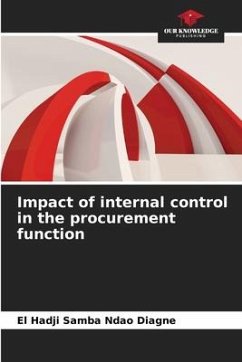
The determinants of the Purchasing function in Cameroon
An analysis in the water and power sector
Versandkostenfrei!
Versandfertig in 6-10 Tagen
57,99 €
inkl. MwSt.

PAYBACK Punkte
29 °P sammeln!
Long relegated to second place because it was considered a support function that did not require real expertise, the purchasing function was slow to take center stage in management and academia. Even today, although managers around the world recognize its strategic nature, it is still underestimated. One only has to judge its level of involvement in strategic decisions in companies or the derisory number of publications that are made on its subject. This is paradoxical, when we know that managers agree that the purchasing function manages an average of 60% of a company's turnover. With this in...
Long relegated to second place because it was considered a support function that did not require real expertise, the purchasing function was slow to take center stage in management and academia. Even today, although managers around the world recognize its strategic nature, it is still underestimated. One only has to judge its level of involvement in strategic decisions in companies or the derisory number of publications that are made on its subject. This is paradoxical, when we know that managers agree that the purchasing function manages an average of 60% of a company's turnover. With this in mind, we looked at this function in Cameroon, in order to analyze its determinants, taking as a framework of analysis the water and electrical energy sector. The result of our analysis is that in its current state of operation, the purchasing function is not cut out to play the strategic role it should and to provide the company with a sustainable competitive advantage in the light of Jay B. Barney's Resource Based View. Barney's Resource Based View.












